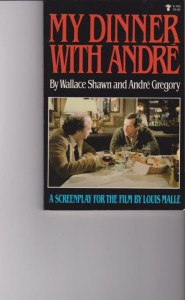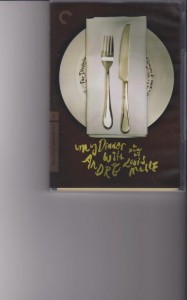(left: the script signed by Wallace Shawn; right: highly recommended: the Criterion version with interviews with the 2 stars of the most famous talking-heads movie ever made)
The great 1981 film classic directed by Louis Malle. Daring–consisting mainly of 2 hours of non-stop conversation between two male friends in a restaurant. Stars screenplay writers Wallace Shawn and Andre Gregory. Full of challenging material for complacent people and viewers. Some quotes:
“‘I could always live in my art, but never in my life.’”
“I mean, really, we’re just going around all day like unconscious machines, and meanwhile there’s all this rage and worry and uneasiness just building up and building up inside us.”
“Because somehow in our social existence we’re only allowed to express our feelings weirdly and indirectly. If you express them directly, everyone goes crazy.”
“Everything passes in a kind of trance.”
“…one of the reasons that we don’t know what’s going on is that when we’re there at one of these parties we’re all too busy performing. We’re concentrating on playing our own roles and giving a good performance, so we can’t perceive what’s going on around us.”
“And so everyone acts as if they know exactly how they ought to conduct themselves at every single moment, and they all seem totally self-confident. Of course, privately, people are very mixed up about themselves, you know, and don’t know what they should be doing in their lives, and they’re reading all these self-help books–”
“You know, we do live in ludicrous ignorance of each other….But we really don’t dare to ask each other.”
“We just put no value at all on perceiving reality.”
“Our minds are just focused on these goals and plans, which in themselves are not reality….They’re part of a dream life.”
“And if you’re just operating by habit, then you’re not really living. I mean, you know, in Sanskrit, the root of the verb “to be” is the same as “to grow” or “to make grow”.
“If you’re just eating out of habit, you don’t taste the food, and you’re not in touch with the reality of what’s happening to you; you’re in a dream world again.”
“Because we don’t see the world. We don’t see ourselves. We don’t see how our actions affect other people.”
“But has it ever occurred to you, Wally, that the process which creates this boredom that we see in the world now may very well be a self-perpetuating unconscious form of brainwashing created by a world totalitarian government based on money?…that somebody who’s bored is asleep? And somebody who’s asleep will not say no?”
“You see, I keep thinking that we need a new language, a language of the heart…some kind of language between people that is a new kind of poetry, that is the poetry of the dancing bee, that tells us where the honey is.”
“You see, Wally, the trouble with always being active and doing things is that it’s quite possible to do all sorts of things and at the same time be completely dead inside.”
“Because I do believe that if you’re just living mechanically, then you have to change your life.”
“I just had to put myself into a kind of training program to learn how to be a human being.”
“[I had to] cut out all the noise around me and stop performing for a few moments and just listen to what was inside me.”
“…or maybe what we’re really talking afraid of is thinking about a kind of existence that we’ve lost, which if were to remember would make us give up everything.”
“I think it’s that moment of contact with another person. That’s what scares us. That moment of being face to face with another person.”
(1st published here June 13, 2014)


